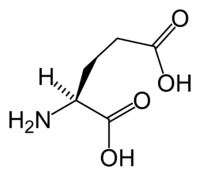
Photo from wikipedia
Schizophrenia is a complex mental disorder with a genetic component. The GRIK gene family encodes ionotropic glutamate receptors of the kainate subtype, which are considered candidate genes for schizophrenia. We… Click to show full abstract
Schizophrenia is a complex mental disorder with a genetic component. The GRIK gene family encodes ionotropic glutamate receptors of the kainate subtype, which are considered candidate genes for schizophrenia. We screened for rare and pathogenic mutations in the protein-coding sequences of the GRIK gene family in 516 unrelated patients with schizophrenia using the ion semiconductor sequencing method. We identified 44 protein-altered variants, and in silico analysis indicated that 36 of these mutations were rare and damaging or pathological based on putative protein function. Notably, we identified four truncating mutations, including two frameshift deletion mutations (GRIK1p.Phe24fs and GRIK1p.Thr882fs) and two nonsense mutations (GRIK2p.Arg300Ter and GRIK4p.Gln342Ter) in four unrelated patients with schizophrenia. They exhibited minor allele frequencies of less than 0.01% and were absent in 1517 healthy controls from Taiwan Biobank. Functional analysis identified these four truncating mutants as loss-of-function (LoF) mutants in HEK-293 cells. We also showed that three mutations (GRIK1p.Phe24fs, GRIK1p.Thr882fs, and GRIK2p.Arg300Ter) weakened the interaction with the PSD95 protein. The results suggest that the GRIK gene family harbors ultrarare LoF mutations in some patients with schizophrenia. The identification of proteins that interact with the kainate receptors will be essential to determine kainate receptor-mediated signaling in the brain.
Journal Title: Journal of Personalized Medicine
Year Published: 2022
Link to full text (if available)
Share on Social Media: Sign Up to like & get
recommendations!